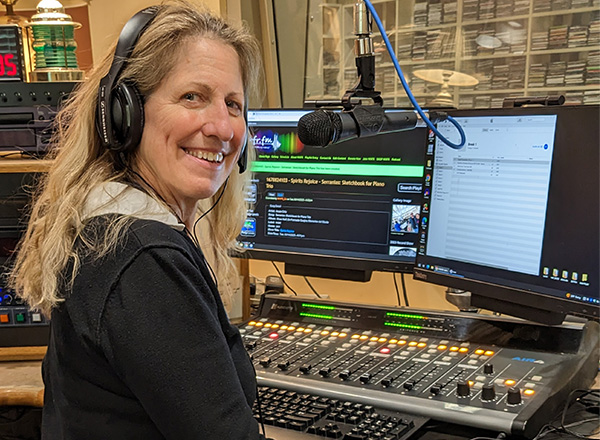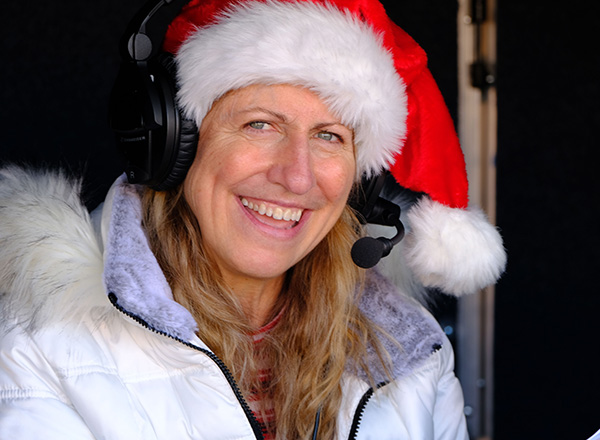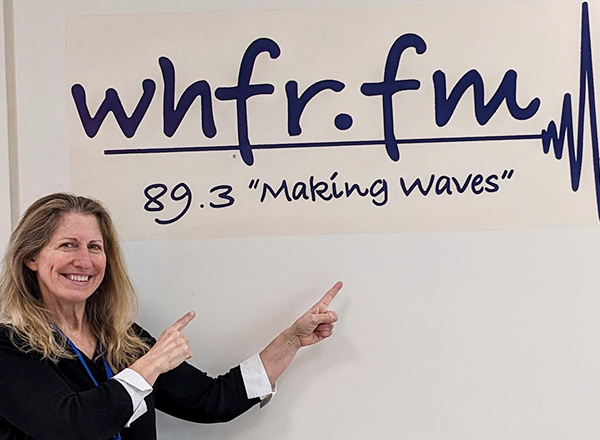Get to Know HFC: Susan McGraw gives students a platform, a voice, and inspiration

It’s no secret that Susan McGraw loves to use her voice in creative ways. And that has turned out to be an important skill.
McGraw has made her career using her voice for more than 30 years in the broadcasting field, doing voiceover and performances in addition to writing and producing news, conducting interviews, and hosting community events. She has taught at HFC since 1996, where she serves as chairperson for the Department of Communication and Media – which includes speech, journalism, telecommunication, and social media. She runs the HFC cable TV channel and the independently-run/non-commercial broadcast radio station housed at the College, WHFR-FM (89.3). She can also be heard narrating the Hammond Planetarium’s spring and fall shows, and her voice pops up in other places at the College as well.
“When you have a passion for what you do, you want to share that passion. I love communication. I love asking questions and answering questions. I love seeing people learning. It’s exciting and energizing for me to be on a college campus, especially one this committed to the success of our students,” said McGraw, who lives in Canton with her husband Jamie Racklyeft and her son Johnny.
Born and raised in Garden City, McGraw is the youngest of nine children. She joked that in order to be heard in such a large family, she had to speak with conviction. An alumna of Garden City High School, she attended HFC (then Henry Ford Community College) and earned her associate degree in communication. After graduating from HFC, McGraw transferred to Wayne State University. There, she earned both her bachelor’s and master’s degrees in communication and media arts.
Synonymous with WHFR
Due to her dedication to the station, McGraw and WHFR are often seen as synonymous.
“I grew up on radio. I love radio. All signs pointed to radio,” she said. “I enjoy working with the students at WHFR and providing them guidance and support at this stage of their personal and academic journeys.”
When it began in 1962, WHFR was the Student Radio Club that broadcasted out of a room not much bigger than a broom closet in the Student Center. It operated a PA system that connected to the cafeteria (the “Pagoda Room,” as it was known at the time), providing music and campus announcements during the weekday hours.
The Student Radio Club’s ultimate goal was to become a broadcast radio station, serving the unique music and informational needs of the community.
By 1978, the HFC administration recognized the dedication of the student radio club and applied for an FM broadcast license from the Federal Communications Commission. Although the license was granted in 1979, the necessary preparations to broadcast – construction, equipment, staffing, and budgeting – took until 1985, when the station was ready to go on the air.
The early broadcast schedule was six hours per day, six days per week. All shows were prerecorded. WHFR grew steadily and attracted more volunteers, going “live” for the first time in 1987 (for three hours per week).
McGraw’s voice was the first to be heard live on the air. In 1988, with a schedule of 12 hours per day, the station moved to bigger quarters, eventually settling in its current location in the Student and Culinary Arts Center (Bldg. M). Since 1997, WHFR has achieved a 24/7 broadcasting schedule with the help of more than 40 volunteers.
“Most community college radio stations are micromanaged by the administration. That’s not the case here. Although the HFC Board of Trustees holds the license, we operate independently and have always had the support and trust of our wonderful administration,” said McGraw. “We are a full-fledged, FM-licensed broadcast facility at WHFR, and we treat it as such. The station is designed for students interested in careers in mass media to learn the broadcast and business side of things, including the latest in media technology. At the same time, we get to promote and support our campus and community, as well as local independent artists. It’s a win-win for everyone!”
WHFR’s ever-changing mission
McGraw’s first foray into WHFR happened a few days before her first day as a student at HFC.
“I was walking around the campus getting familiar with my new school and a student volunteer at WHFR was stopping people in the hall to show them the radio station,” recalled McGraw. “I went in and was excited by what I saw. It felt like home to me – comfortable and natural. I was hooked.”
McGraw considers Jay Korinek, a retired HFC telecommunication instructor and one of WHFR’s pioneers, her mentor. When Korinek retired from full-time faculty in 2007, McGraw succeeded him as the WHFR General Manager. Korinek remained as station advisor at WHFR until 2017.
“Susan’s a wonderful person and a wonderful teacher,” said Korinek. “(Former HFC President) Andy Mazzara wanted to hire her as a full-time instructor in 2002 because he was so impressed with her background, her community ties, and her broadcasting experience. Susan was still raising her son and wanted to spend more time with him before accepting Andy’s offer, which she did just before I retired. The telecom program was in good hands. She’s outstanding and has put in so many years of service to the College. Everyone respects her and realizes she’s a professional and compassionate person. I might have retired much earlier if she weren't around because it was such a pleasure working with her.”
Mazzara agreed with Korinek.
“Susan is a dedicated, hardworking, and able leader of the radio station and a very kind person and friend,” said Mazzara.
McGraw is known for her exuberance, energy, and diplomacy in everything she does at the College. In addition to being a full-time faculty member, her WHFR Station Manager duties include:
- Managing the budget
- Supervising the people who run the station's programming
- Coordinating fundraising events to keep the station going
- Cultivating membership, community, and listener relations
“WHFR’s format is ever-changing, which forces us to be constantly evolving,” she said. “We play music that is not heard on other radio stations, which strengthens the need for local independent artists to have their voices heard on some platform.”
Returning to HFC after 14 years at WCAR
After completing her undergraduate education, McGraw worked at WCAR-AM (1090) in Livonia for 14 years, where she did everything from newswriting to hosting a talk show, as well as moderating political debates. She became the station manager and stayed through two ownership changes.
“It was all local and original programming,” she recalled. “I got to see firsthand how a local radio station operated.”
McGraw left WCAR and eventually returned to her alma mater to teach.
"Susan is a positive, powerful voice for HFC students and the larger college community,” said HFC School of Liberal Arts Associate Dean Pamela Stewart. “She is an integral part of the SoLA instructional leadership team, and she leads from a place of integrity and kindness."
HFC Vice President of Academic Affairs Dr. Michael Nealon agreed with Stewart.
“I have watched in awe and gratitude as Susan has, with unbounded dedication and passion, worked to grow and continuously improve HFC’s communications program, as well as our successful WHFR-FM radio station,” said Nealon. “She has poured her considerable expertise, experience, and enthusiasm into student success, teaching excellence, community partnership, and service to others. Susan lives HFC’s mission, never stepping back from an opportunity to help ‘transform lives and build better futures.’ She is a Hawk who truly knows how to soar!”
Empowering people
Some of McGraw’s favorite classes to teach include:
“It’s exciting to see students who have never considered the media and communication arts field try it – whether it’s doing voiceover work or being behind the camera – and see that lightbulb turn on in their heads,” she said. “That’s one of the rewards of teaching and is very empowering.”
HFC lab technician D. Mark Hall has worked at HFC since 2020, reporting to McGraw. He credits her as a mentor and would like to teach telecom at the College after completing his education.
“I think the most important thing Susan has taught me is to assume the best intentions on the part of others. As a military veteran dealing with issues pertaining to PTSD, it's been almost my default to assume the worst in others,” said Hall. “Susan's mantra in every department I've worked with her or studied with her has been to give people the benefit of the doubt. Over time, I've taken that to heart and the result has been a significant relief from my conscience and my shoulders and a growing ability to have faith in people again. This has led me to want to do more for others, as she does. My approach and interaction with the world around have changed for the better. I credit Susan McGraw with a great deal of that.”

